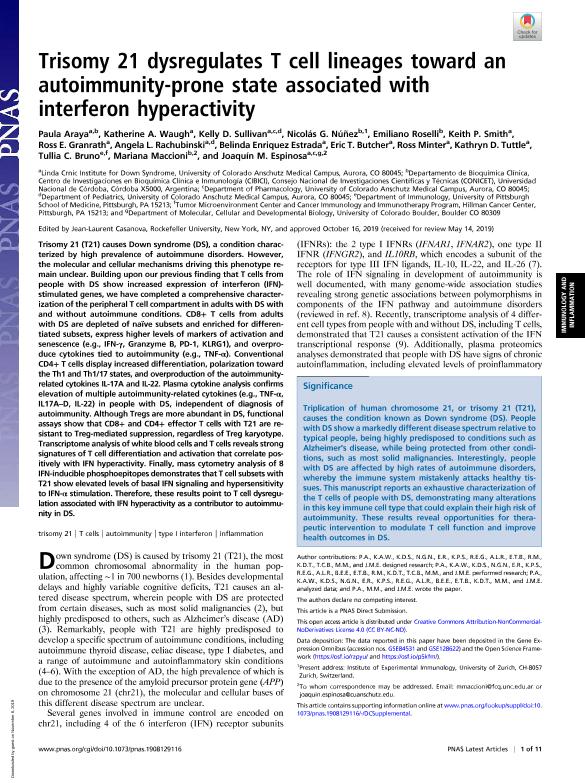Mostrar el registro sencillo del ítem
dc.contributor.author
Araya, Paula

dc.contributor.author
Waugh, Katherine A.
dc.contributor.author
Sullivan, Kelly D.
dc.contributor.author
Núñez, Nicolás

dc.contributor.author
Roselli, Emiliano

dc.contributor.author
Smith, Keith P.
dc.contributor.author
Granrath, Ross E.
dc.contributor.author
Rachubinski, Angela L.
dc.contributor.author
Enriquez Estrada, Belinda
dc.contributor.author
Butcher, Eric T.
dc.contributor.author
Minter, Ross
dc.contributor.author
Tuttle, Kathryn D.
dc.contributor.author
Bruno, Tullia C.
dc.contributor.author
Maccioni, Mariana

dc.contributor.author
Espinosa, Joaquín M.
dc.date.available
2021-08-10T16:28:44Z
dc.date.issued
2019-11
dc.identifier.citation
Araya, Paula; Waugh, Katherine A.; Sullivan, Kelly D.; Núñez, Nicolás; Roselli, Emiliano; et al.; Trisomy 21 dysregulates T cell lineages toward an autoimmunity-prone state associated with interferon hyperactivity; National Academy of Sciences; Proceedings of the National Academy of Sciences of The United States of America; 11-2019
dc.identifier.issn
0027-8424
dc.identifier.uri
http://hdl.handle.net/11336/138092
dc.description.abstract
Trisomy 21 (T21) causes Down syndrome (DS), a condition characterized by high prevalence of autoimmune disorders. However, the molecular and cellular mechanisms driving this phenotype remain unclear. Building upon our previous finding that T cells from people with DS show increased expression of interferon (IFN)stimulated genes, we have completed a comprehensive characterization of the peripheral T cell compartment in adults with DS with and without autoimmune conditions. CD8+ T cells from adults with DS are depleted of naïve subsets and enriched for differentiated subsets, express higher levels of markers of activation and senescence (e.g., IFN-γ, Granzyme B, PD-1, KLRG1), and overproduce cytokines tied to autoimmunity (e.g., TNF-α). Conventional CD4+ T cells display increased differentiation, polarization toward the Th1 and Th1/17 states, and overproduction of the autoimmunity-related cytokines IL-17A and IL-22. Plasma cytokine analysis confirms elevation of multiple autoimmunity-related cytokines (e.g., TNF-α, IL17A–D, IL-22) in people with DS, independent of diagnosis of autoimmunity. Although Tregs are more abundant in DS, functional assays show that CD8+ and CD4+ effector T cells with T21 are resistant to Treg-mediated suppression, regardless of Treg karyotype. Transcriptome analysis of white blood cells and T cells reveals strong signatures of T cell differentiation and activation that correlate positively with IFN hyperactivity. Finally, mass cytometry analysis of 8 IFN-inducible phosphoepitopes demonstrates that T cell subsets with T21 show elevated levels of basal IFN signaling and hypersensitivity to IFN-α stimulation. Therefore, these results point to T cell dysregulation associated with IFN hyperactivity as a contributor to autoimmunity in DS.
dc.format
application/pdf
dc.language.iso
eng
dc.publisher
National Academy of Sciences

dc.rights
info:eu-repo/semantics/openAccess
dc.rights.uri
https://creativecommons.org/licenses/by-nc-sa/2.5/ar/
dc.subject
AUTOIMMUNITY
dc.subject
INFLAMMATION
dc.subject
T CELLS
dc.subject
TRISOMY 21
dc.subject
TYPE I INTERFERON
dc.subject.classification
Inmunología

dc.subject.classification
Medicina Básica

dc.subject.classification
CIENCIAS MÉDICAS Y DE LA SALUD

dc.title
Trisomy 21 dysregulates T cell lineages toward an autoimmunity-prone state associated with interferon hyperactivity
dc.type
info:eu-repo/semantics/article
dc.type
info:ar-repo/semantics/artículo
dc.type
info:eu-repo/semantics/publishedVersion
dc.date.updated
2020-11-25T17:47:28Z
dc.journal.pais
Estados Unidos

dc.journal.ciudad
Washington DC, USA
dc.description.fil
Fil: Araya, Paula. Consejo Nacional de Investigaciones Científicas y Técnicas. Centro Científico Tecnológico Córdoba. Centro de Investigaciones en Bioquímica Clínica e Inmunología; Argentina
dc.description.fil
Fil: Waugh, Katherine A.. University Of Colorado. School Of Medicine.; Estados Unidos
dc.description.fil
Fil: Sullivan, Kelly D.. University Of Colorado. School Of Medicine.; Estados Unidos
dc.description.fil
Fil: Núñez, Nicolás. Consejo Nacional de Investigaciones Científicas y Técnicas. Centro Científico Tecnológico Córdoba. Centro de Investigaciones en Bioquímica Clínica e Inmunología; Argentina
dc.description.fil
Fil: Roselli, Emiliano. Consejo Nacional de Investigaciones Científicas y Técnicas. Centro Científico Tecnológico Córdoba. Centro de Investigaciones en Bioquímica Clínica e Inmunología; Argentina
dc.description.fil
Fil: Smith, Keith P.. University Of Colorado. School Of Medicine.; Estados Unidos
dc.description.fil
Fil: Granrath, Ross E.. University Of Colorado. School Of Medicine.; Estados Unidos
dc.description.fil
Fil: Rachubinski, Angela L.. University of Colorado; Estados Unidos
dc.description.fil
Fil: Enriquez Estrada, Belinda. University Of Colorado. School Of Medicine.; Estados Unidos
dc.description.fil
Fil: Butcher, Eric T.. University of Colorado; Estados Unidos
dc.description.fil
Fil: Minter, Ross. University of Colorado; Estados Unidos
dc.description.fil
Fil: Tuttle, Kathryn D.. University of Colorado; Estados Unidos
dc.description.fil
Fil: Bruno, Tullia C.. University Of Colorado. School Of Medicine.; Estados Unidos
dc.description.fil
Fil: Maccioni, Mariana. Consejo Nacional de Investigaciones Científicas y Técnicas. Centro Científico Tecnológico Córdoba. Centro de Investigaciones en Bioquímica Clínica e Inmunología; Argentina
dc.description.fil
Fil: Espinosa, Joaquín M.. University Of Colorado. School Of Medicine.; Estados Unidos
dc.journal.title
Proceedings of the National Academy of Sciences of The United States of America

dc.relation.alternativeid
info:eu-repo/semantics/altIdentifier/url/http://www.pnas.org/lookup/doi/10.1073/pnas.1908129116
dc.relation.alternativeid
info:eu-repo/semantics/altIdentifier/doi/http://dx.doi.org/10.1073/pnas.1908129116
dc.relation.alternativeid
info:eu-repo/semantics/altIdentifier/url/https://www.pnas.org/content/116/48/24231
Archivos asociados
